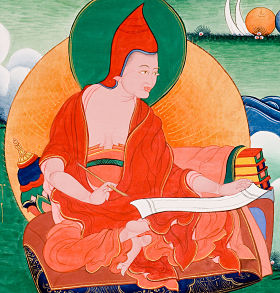51. Change of Mind: Vasubandhu and Yogācāra Buddhism
Vasubandhu’s path to Yogācāra Buddhism, a form of idealism which holds that nothing can be mind-independent.
Themes:
• S. Anacker (trans.), Seven Works of Vasubandhu: the Buddhist Psychological Doctor (Delhi: 1984).
• H. Buescher, The Inception of Yogacārā-Vijñānavāda (Vienna: 2008).
• M. D’Amato, “Three Natures, Three Stages: an Interpretation of the Yogacara Trisvabhava Theory,” Journal of Indian Philosophy 33 (2005), 185-207.
• J. Duerlinger, Indian Buddhist Theories of Persons: Vasubandhu’s Refutation of the Theory of a Self (London: 2003).
• J.L. Garfield and J. Westerhoff (eds), Madhyamaka and Yogacārā: Allies or Rivals? (Oxford: 2015).
• J.C. Gold, Paving the Great Way: Vasubandhu’s Unifying Buddhist Philosophy (New York: 2015).
• I. Harris, The Continuity of Madhyamaka and Yogācāra in Indian Mahāyāna Buddhism (Leiden: 1991).
• R. King, “Early Yogācāra and its Relationship with the Madhyamaka School,” Philosophy East and West 44 (1994), 659-83.
• T.E. Wood, Mind Only: a Philosophical and Doctrinal Analysis of Vijñānavāda (Honolulu: 1991).







Comments
no evidence that Vasubandhu converted to "Sautraantika"
Please take this into consideration:
https://archive.org/details/vasubandhuandtheyogacarabhumiyogacaraelemen…
Add new comment